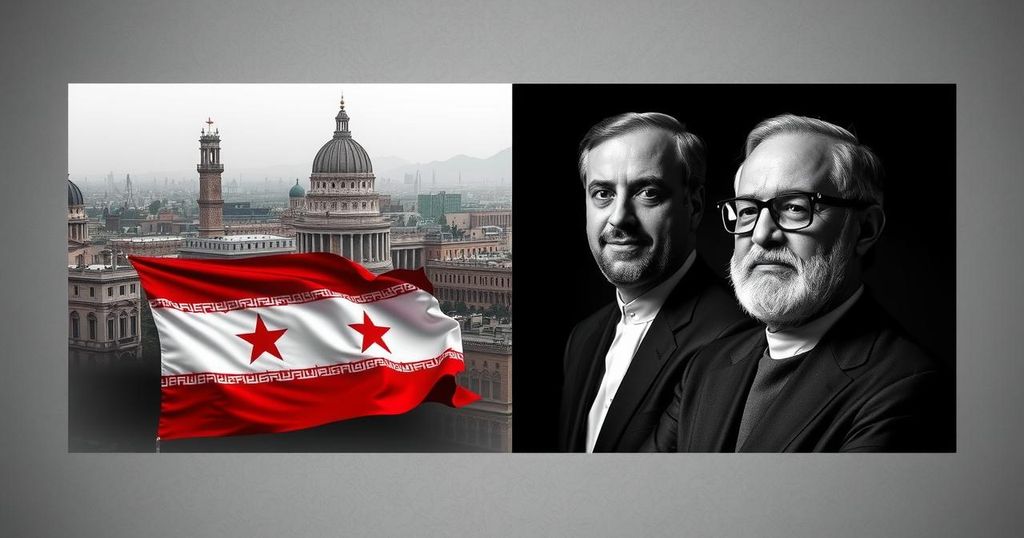Iranian Establishment Faces Internal Divisions Following Assad’s Fall in Syria

The Iranian establishment faces a divide following the rapid collapse of Bashar al-Assad’s regime in Syria. Internal disagreements reveal differing perspectives on Iran’s foreign policy strategy; some factions advocate for continuity with HTS while others call for new proxy groups. The geopolitical ramifications extend to Lebanon, where Iran risks losing influence as the West intensifies scrutiny of its actions, including its nuclear program.
As Bashar al-Assad’s regime faltered in Syria, Iranian officials faced an unexpected turn of events when rebel forces swiftly overtook key cities across the nation with minimal resistance. Alarmingly, as Hezbollah shifted focus to confront Israel in Lebanon, they left vital checkpoints unattended, exacerbating the Syrian army’s collapse. Despite calls for protection from Iranian leadership, efforts to safeguard sacred sites were unsuccessful amid ongoing Israeli air strikes targeting Iranian and Hezbollah interests.
Following significant advancements by rebel forces towards Damascus, Iranian state media changed its narrative, referring to these groups as “armed factions” rather than “terrorists.” Leaked reports later claimed Tehran had received assurances from Hay’at Tahrir al-Sham (HTS) regarding the safety of Shia shrines, aimed at appeasing religious leaders and critics of the regime. Internal dissent arose within Iran, with some factions feeling the governing body had inadequately supported Assad, while others viewed the collapse as a potential for reevaluation of Iran’s foreign policy, advocating for a shift in focus towards regional dynamics rather than strict ideological commitments.
Discussions among Iranian decision-makers reveal divergent strategies in the aftermath of Assad’s fall. Some propose maintaining contact with HTS to ensure Iran’s influence in Syria while others advocate for the establishment of new proxy groups to counterbalance the emerging Sunni extremism. Supreme leader Ayatollah Ali Khamenei asserted that the resistance against perceived external threats remains strong and that shifting dynamics in Syria could eventually enhance Iran’s strategic positioning.
In light of the Syrian conflict’s trajectory, analysts suggest that Iran’s diminishing hold could also affect its alliances in Lebanon and beyond. With Hezbollah potentially unable to sustain its political influence, the evolving situation may invite new challenges for Iranian interests, especially as the West is expected to intensify its scrutiny of Iranian activities, including its nuclear ambitions. Ultimately, this situation may compel Iran to reconsider its long-standing approach to foreign relations and domestic policy.
The Iranian establishment has experienced a notable divide regarding its policy in Syria following the collapse of Bashar al-Assad’s regime. As Iranian authorities initially underestimated the rebels’ capability to conquer territory swiftly, their subsequent responses to the shifting landscape demonstrated a level of disarray within the government. The conflict in Syria has significant implications for Iran’s strategic interests, including its alliances and overarching foreign policy centered on regional influence and the promotion of the Islamic Revolution. As Iran grapples with a sense of urgency due to the domino effect of its allies’ failures, particularly in Lebanon and the broader region, the discourse surrounding ideological commitments versus pragmatic approaches has intensified among various factions within the Iranian political landscape. This need to reassess foreign policy in light of recent events underpins the evolving dynamics of Iran’s role in a turbulent Middle Eastern geopolitics.
The fall of Bashar al-Assad’s regime in Syria has precipitated a profound internal debate within Iran regarding its approach to foreign policy and regional influence. As factions within the Iranian establishment either criticize the government’s perceived shortcomings or see opportunity in the changing landscape, the collapse presents a crucial juncture for reevaluating long-standing ideological commitments in favor of strategic pragmatism. The implications for Iran’s influence in Lebanon and potential adjustments to its nuclear strategy may arise as the power dynamics in the region continue to evolve.
Original Source: www.middleeasteye.net








